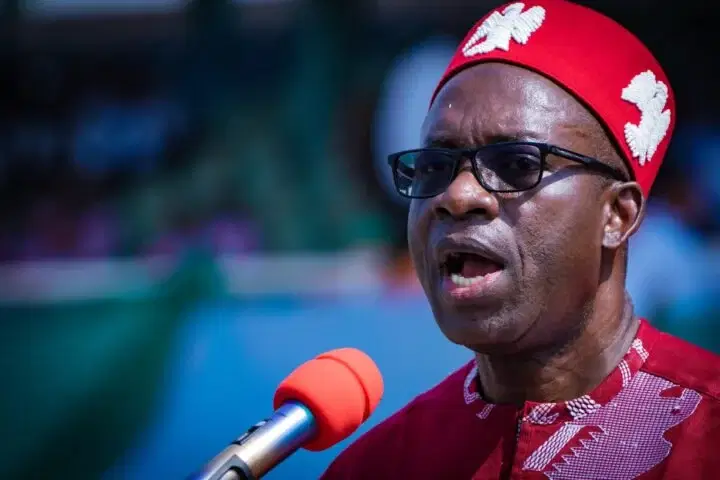
Raphael Kanu
Governor Chukwuma Soludo of Anambra State is facing a wave of backlash after he promised a ₦1 million cash reward for every ward won by his party, the All Progressives Grand Alliance (APGA), in the forthcoming November 8 governorship election.
Soludo made the controversial announcement during a campaign rally in Umunze, Orumba South Local Government Area, declaring that the “performance-based incentive” would spur the party to victory.
“When we were campaigning for the Senate, any ward that APGA won received ₦1 million, and we won all the wards in Orumba South. We will redeem that promise next week. For November 8, any ward that wins again will receive ₦1 million, while the first three performing wards will get ₦5 million, ₦3 million, and ₦2 million respectively,” Soludo told cheering supporters.
The governor’s words set off a political storm. Opposition parties and civil-society groups branded the pledge a textbook case of inducement and a brazen breach of the Electoral Act. According to the Independent National Electoral Commission (INEC), about 2.8 million registered voters are expected to participate in the Anambra poll featuring 16 parties and candidates.
From the APC to the Labour Party and PDP, condemnation poured in. Dr Ijeomah Arodiogbu, APC National Vice Chairman (South-East), fumed that Soludo’s action was “vote-buying, plain and simple.” He said the governor was using state resources to induce voters and described it as an abuse of office. “We will petition INEC, EFCC, and the Police to investigate,” Arodiogbu vowed.
Mallam Bolaji Abdullahi, spokesperson for the African Democratic Congress (ADC), described the governor’s remarks as “a public confession of vote-buying.” The Labour Party’s National Publicity Secretary, Obiora Ifoh, accused Soludo of “weaponising poverty” to win votes. “He failed to deliver on governance and is now trying to buy legitimacy. This is shameful,” Ifoh declared.
Mike Ahumibe, a former PDP Zonal Organising Secretary, said Soludo’s conduct undermines electoral integrity, warning that any election influenced by money cannot be free or fair.
Civil-society organisations were equally scathing. Debo Adeniran, Executive Director of the Centre for Anti-Corruption and Open Leadership (CACOL), called Soludo’s promise “reprehensible and criminal.” He argued that the governor had institutionalised vote-buying and monetised the process, adding that it was an electoral crime for which he could be tried after leaving office. “INEC must apply the law—his immunity doesn’t cover electoral offences,” Adeniran said.
Former Inter-Party Advisory Council (IPAC) Chairman, Alhaji Yabagi Sani, warned that Soludo’s approach commercialises elections using public funds, adding that it sets a dangerous precedent for Nigerian democracy. “That’s rigging through the back door,” Sani thundered, urging INEC, the Police, and the EFCC to act fast.
Election watchdog YIAGA Africa also criticised the move, saying it exposed the deep-rooted culture of material inducement in Nigerian politics. Jennifer Dafwat, its media officer, said vote-buying isn’t limited to handing out cash on election day, and that any incentive aimed at swaying voters is unethical. “Soludo’s remarks exploit hunger and turn elections into business deals,” she said.
The Anambra State Government has rejected the allegations, insisting Soludo’s statement was misinterpreted. Dr Law Mefor, Commissioner for Information, dismissed the outrage as political mischief. “How does motivation amount to vote-buying? A vote must be purchased for it to be vote-buying. Soludo hasn’t bought any votes,” Mefor argued. He maintained that offering incentives is a legitimate campaign strategy, not a crime, adding that political motivation can be both intrinsic and extrinsic.
Meanwhile, INEC has announced plans to deploy over 22,000 ad hoc staff to manage 5,720 polling units across Anambra. Dr Kenneth Ikeagu, National Commissioner overseeing the state, confirmed that each unit will have a presiding officer and three assistants, while 540 accredited journalists will monitor proceedings. He urged voters to collect their Permanent Voter Cards (PVCs) promptly. “The PVC is the people’s power. Anyone on the queue by 2:30 p.m. will still vote,” Ikeagu assured.
Reports from Awka, Onitsha, Nnewi, and Amawbia revealed low turnout at collection centres and slow service from INEC officials. Okelo Madukaife, a former APC Publicity Secretary, faulted the commission for deploying too few staff, while Labour Party’s Johnson Okoye lamented poor sensitisation. “Many people don’t even know their PVCs are ready. INEC must wake up—our votes are our voice,” Okoye said.
Political analysts say the uproar over Soludo’s ₦1 million-per-ward pledge exposes Nigeria’s fragile electoral ethics. While the government frames it as motivation, critics view it as vote-buying in disguise—a reflection of how poverty and patronage continue to shape electoral behaviour. As Anambra heads for the November 8 polls, all eyes are on INEC and the security agencies to uphold the law and ensure that money does not trump merit in the ballot box.
